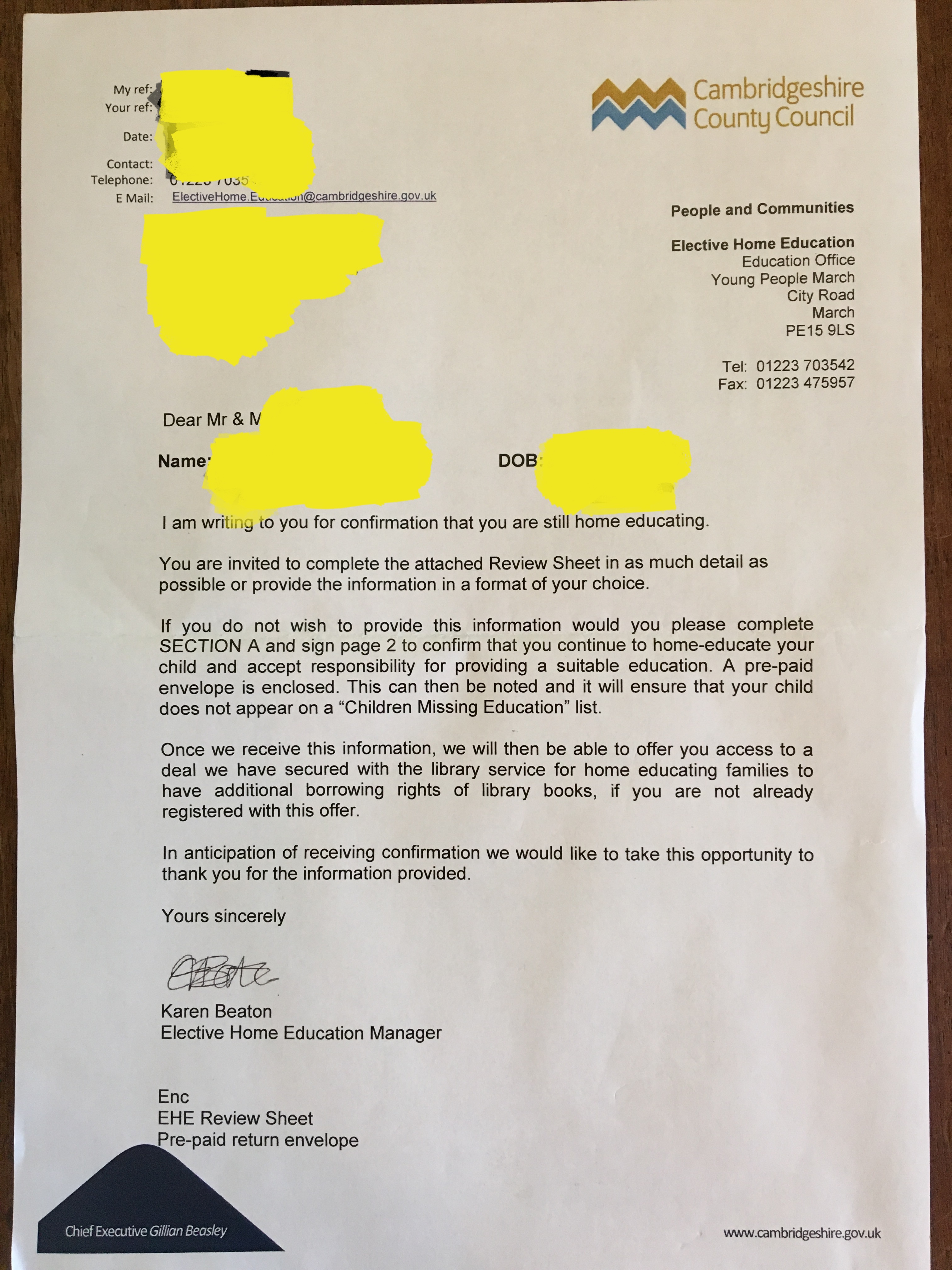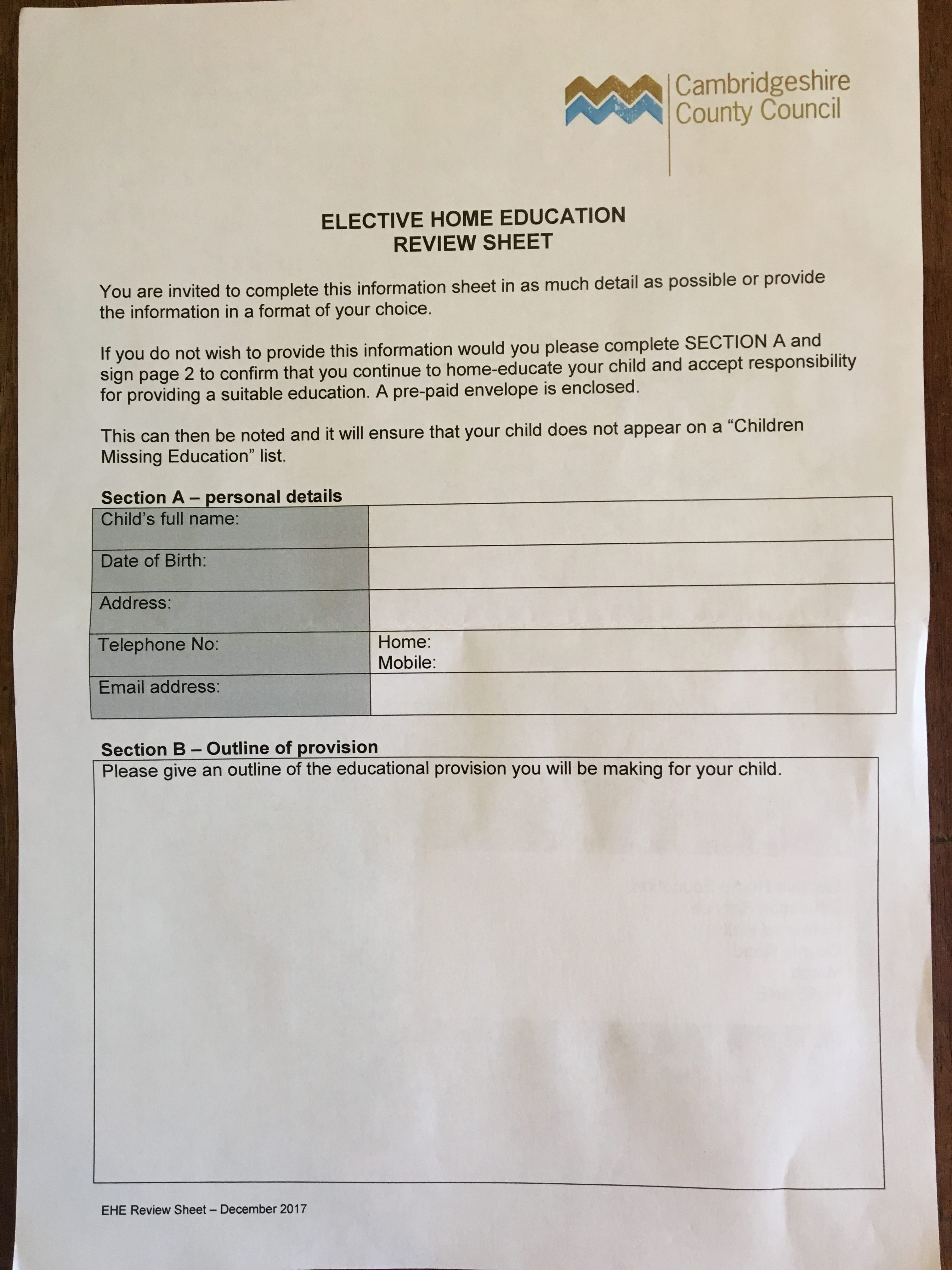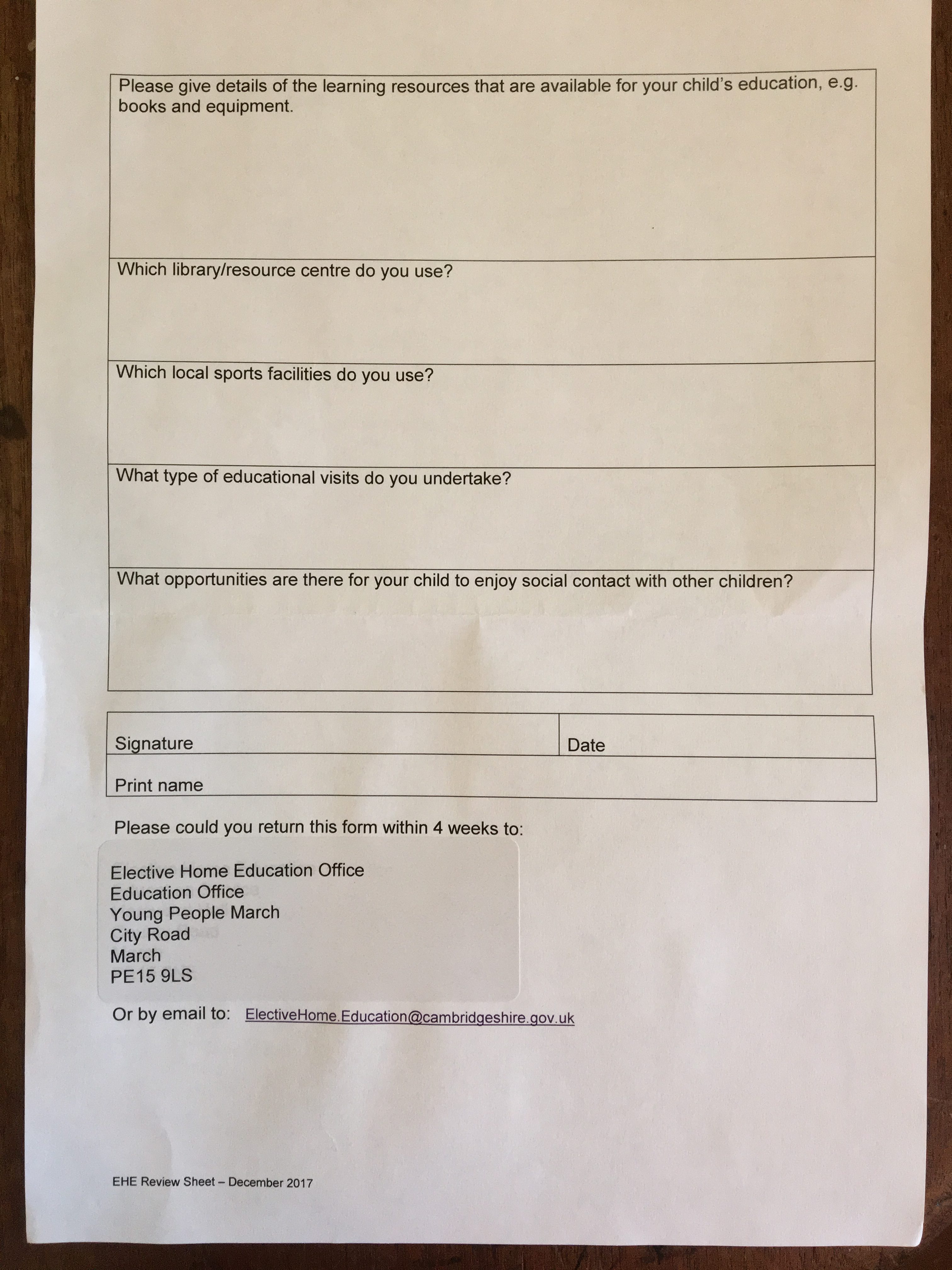HE and the LA

This is Cambridgeshire specific, so does not apply to the country as a whole, where many Local Authorities (LAs) have very different approaches. To find out if you are come under the Cambridgeshire LA click here.
On the whole, the majority of HEors in Cambridgeshire would say that they currently have a very good relationship with the Local Authority (LA). Historically, this has not always been the case, but over the last 17 years or so, both the Cambridgeshire Local Authority (LA) and the Cambridgeshire HEing community have been working very hard to improve things.
It is often estimated that about half of all HEors are ‘unknown’ to the LA (no official stats on this as, by definition, if you are ‘unknown’ you can’t be counted; by ‘unknown’ we mean not on the LA’s register of children), if this is you, then you may very well never come into contact with the LA throughout your whole HEing experience. Of those that are ‘known’, contact with the LA will generally be minimal, usually just once a year via an online form.
- What to Expect from the LA When You Deregister
- ‘The Offer’
- The Online Elective Home Education (EHE) Form
- The Report or Ed Phil
- How the LA Works Within the Law
- Home Visits
- Refusing Contact or Providing Proof of Evidence
- Voluntarily Registering with the LA
- Becoming known to the LA Without Registering Yourself or Coming Out of School
- Learning and the LA
- The Cambridgeshire HE Forum
- Continuing Distrust of the LA
- Links
_____________________________
What to expect from the LA when you de-register
This was asked on a local HE Facebook group recently (Feb 2023), and the best reply came from Natalie K:
“Sometimes the LA contact quite quickly, other times it might take a few weeks – it’s really hard to say.
They’ll likely send an introductory letter which includes a website to visit to complete their forms. It’s actually not recommended to complete the forms as they ask for information they either already have or aren’t entitled to. You shouldn’t give plans as you don’t want holding to them further down the line. Instead it’s better to advise them that you’ll give a retrospective report written in your own words, about 6-8 weeks after deregistration is a good time frame so you’ve got a bit to write about 🙂 Their letter will give a much shorter time frame for completing their forms so do email them and let them know to expect a report a bit later instead, this is perfectly fine to do 🙂
Cambs LA are one of the better ones and so far have been very hands off. They just touch base once a year at which point you can provide an updated report.
For lots of information and support I highly recommend joining [the Home Education For All (H.E.F.A) Facebook group]. There are templates for letters and reports and they offer completely free report checks 🙂 Do make sure you answer all questions when requesting to join.”
When you initially deregister from school, you should generally hear from the LA within about a month via a letter. The school is legally obliged to tell the LA that you have pulled your child out of school and that you plan to home educate. The LA will then send you a letter asking you to confirm that you are indeed HEing and what provisions you have in place for this.
If you do not hear from the LA, it is possible that the school have not de-registered you. As long as you have proof that you have handed in your deregistration letter (how to de-register), you will be fine.
It is not your legal responsibility to tell the LA that you are now home educating, but…
If the school have not deregistered you properly, it is possible that you could find yourself in a position where you/your child is being investigated in case they are a ‘Child Missing Education’. Don’t panic, this is extremely rare, but it is always better to know everything before you begin on this great journey.
Some choose to register themselves with the LA to make absolutely certain that they are ‘known’, and some may see it as an act of liberation from a school that they feel did not meet their needs or was actively detrimental to their child’s development. But that is entirely your call, you do not have to contact the LA, you can wait for them to contact you.
_____________________________
‘The Offer’

Part of the Cambridgeshire LA building positive relationships with the HE community has been them putting together something called ‘the offer’.
To be honest, it should be very clear and simple to understand what this offer is, but despite years of being told about it, I am still somewhat hazy on what it actually entails.
From what I can make out, it appears to be marketing speak for the LA getting in contact with people who have just come out of school and double checking that people are leaving school because they want to and not because they are being off-rolled or bullied out of the system. And if they are choosing HE as a positive option, i.e. of their own freewill and because they really want to, the LA will say ‘fine, thank you for telling me’ and then step back and leave them alone.
For those that are being pushed into it, the LA will act as a mediator between the family and the school and try and get all the resources etc in place to help a family through the situation.
How is it an ‘offer’? I hear you ask. No idea, sounds like a procedure to me rather than an offer, but what would I know, I’m just a mother.
In theory, there should be workshops/sessions to help/support families, and online facilities, but since this ‘offer’ was made in 2019, there has been no sign that these things are going to materialise. Equally, it looks like the particle funding for exams could be cancelled in the near future.
So why the marketing speak? A cynic might say, to sell the idea to other government officially people as evidence of managing ‘a situation’.
_____________________________
The Online Elective Home Education (EHE) Form
The online form came into being in the autumn of 2019. Prior to this, it was just a paper form that you had to fill in and send back in the pre-paid, self-addressed envelope (as photographed below).




You had to complete name, contact details etc. but outlining educational provision was optional. Alternatively, you could provide information in a format of your choice, such as a self-written report.
The online form is not so flexible, and is distinctly different in tone to the paper form (no idea why – I have asked the LA, but am yet to hear anything back). You have to leave an answer in ALL boxes in order to submit it.

The original online questions were…
- Why are you home educating?
- How will you or how do you ensure that your child engages with the learning opportunities provided?
- What are the aims of the educational approach that you have adopted?
- How do you or how will you ensure that your child develops basic skills?
- What approach do you or will you take to monitor the impact and progression of the education being provided?
- Please give details of the learning resources that are available for your child’s education, e.g. books and equipment.
- Which library/resource centre do you use?
- Which local sports facilities do you use?
- Which type of educational visits do you undertake?
- What opportunities are there for your child to enjoy social contact with other children?
However, they have since been updated from the beginning of 2023 or so.
THE NEW QUESTIONS ARE… (drum roll)…
- Do you currently employ a tutor? Yes/No
- Is it your plan to utilise online services? Yes/No
- Why are you home educating?
- What are your approaches to learning?
- What is your daily educational plan? (not everyday will be the same, but please describe a typical day)
- Please provide details on the subjects/topics you will cover
- How do you monitor your child’s progression? Please provide examples
- Do you set targets so that your child’s progression can be monitored? Yes/No
- In the event of no progression, what creative approaches do you take to overcome this?
- What aspirations does your child have for their future?
- How have you incorporated their aspirations into their learning?
- How will the learning on offer help your child to be able to fully participate in the community later in life?
- Does your child participate in extra curricular activities? Yes/No
- What educational visits do you plan to undertake?
- What opportunities will there be for your child to enjoy social contact with other children?
(Text is copied *exactly* as it appears in the online form. All answer boxes are text boxes, apart from when it is a binary Yes/No option.)
For the vast majority of home educators, these questions are highly inappropriate and thoroughly ill-fitting to the home education that they provide. It also indicates a lack of understanding of home education from the LA, for instance, there are no such things as “extra-curricular activities” in home education (unless you are literally following a school curriculum at home), *all* visits are educational when you see learning as more than something you do in the class room, and there is no such thing as ‘not progressing’; the brain is developing and learning all the time (even if it isn’t in the direction you want it to be going) – unless there is a health issue, such as brain damage, it is impossible not to progress!
As the law has not recently changed, you are under no legal obligation to fill in these questions, so some opt to just put a dash, N/A or ‘choose not to say’ in the boxes. This, however, may give the LA reason to believe that you are not making adequate provision for your child, and so it is possible that they could follow up with asking for more formal evidence of the education you are providing for your child.
If you DO wish to fill in the online form, you can go into as much or as little detail as you like. For those following a more formal style of education, this is fairly straight forward. For those who are following an autonomous approach, or similar, it can feel really daunting, so the best advice is to be inspired by someone else’s answers… https://www.home-education.org.uk/resources-edphils.htm – as these are a complete educational philosophy, you will have to adapt the information to fit the form.
The general advise is do not to give plans of what you are going to do, instead focusing on what you have done and the progress made. Firstly, this is all that is required by law (it is evidence of providing a ‘suitable’ education). Secondly, it is argued that this information can be held against you, should you not meet the targets you set yourself and your child.
Once you have completed each question, it is worth saving the answer either for child number two/three/four etc. or for next year. It will save you a lot of time in the long run.
Alternatively…
_____________________________
The Report or ‘Ed Phil’
You can email* the LA (https://www.cambridgeshire.gov.uk/residents/children-and-families/schools-learning/education-your-rights-and-responsibilities/elective-home-education-ehe – contact details at bottom of page) saying you will send a complete ‘ed phil’ (educational philosophy) or report to them instead of completing the form. Also mention when they can expect to receive it by; keep the timeframe reasonable, maybe 2-6 weeks, and if it needs to be longer than that, e.g. it’s over Christmas break, just started HE so needing time to find feet etc., explain the reason, so that you do not get unnecessarily hounded.
For help writing a report:
https://www.home-education.org.uk/resources-edphils.htm – example ‘ed phil’s (educational philosophies).
Home Education For All (H.E.F.A) Facebook group – here they have a guide explain how to do one, and will go through your report with you before you sent it off, should you ask them to.
*Always keep your contact with an LA in writing, as best you can. This means you always have a nice, clear paper trail, should you need to draw on it later on.
_____________________________
How the LA Works Within the Law
The Cambridgeshire LA’s understanding of home education law is laid out in section six of their January 2019, Unregistered Schools Strategy: https://www.cambslearntogether.co.uk/asset-library/imported-assets/Unregistered%20Schools%20Strategy%20-%20Cambridgeshire%20and%20Peterborough%20January%20.._.pdf
6.2 Guidance For Local Authority
The guidelines for local authorities on Elective Home Education 2007 & 2013, helps local authorities manage their relationships with home education parents and aims to clarify the balance between the right of the parent to educate their child at home and the responsibilities of the local authorities.
These guidelines explicitly state that:
- Parents who are home educating their children are under no legal duty to register with, or otherwise inform, the local authority;
- The local authority may make informal enquiries of parents who are home educating their children but parents are under no legal duty to respond to these enquiries;
- The local authority may request information from parents who are home educating their children but parents are under no legal duty to respond to these requests;
- The local authority may request that parents who are home educating their children agree to a home visit or other meeting with a local authority officer in order that the provision being made for the children may be assessed but parents are under no legal duty to agree to these requests;
- The local authority has no legal right of access to children who are being home educated by their parents;
- The local authority may serve a School Attendance Order “if it appears” that a home educated child is not in receipt of suitable education (reference to Section 437 of the Education Act 1996).
The guidelines, set within the overall context of section 437 of the 1996 Education Act, suggest that, unless it has reasons to believe otherwise, the local authority should accept that parents who state that they are providing a suitable education for their children at home are indeed providing such an education.
The overriding legal assumption is that a parent is providing a ‘suitable’ education unless there is reason to believe otherwise.
As the Cambridgeshire LA stipulate in the their Unregistered School Strategy (section 6.3), home educating parents are not required to:
- Teach the National Curriculum
- Provide a broad and balanced education
- Have a timetable
- Have premises equipped to any particular standard
- Set hours during which education will take place
- Have any specific qualifications make detailed plans in advance
- Observe school hours, days or terms
- Give formal lessons
- Mark work done by their child
- Formally assess progress or set development objectives
- Reproduce school type peer group socialisation match school-based, age-specific standards.
(Incidentally, many of the questions in the current online annual EHE assessment imply the contrary is true.)
_____________________________
Home Visits
A Local Authority currently has absolutely no legal right to make a home visit to see either you or your child (https://www.home-education.org.uk/legal-home-visits.htm). This is protected by Article 8 of the European Convention on Human Rights:
“everyone has the right to respect for his private and family life, his home and his correspondence”
(European Convention on Human Rights guide to article 8: https://www.echr.coe.int/Documents/Guide_Art_8_ENG.pdf). (Got to love that innate sexism in British law making!) [This is a separate body from the EU and so despite Brexit, this should remain in place for the foreseeable future.]
Currently, Cambridgeshire LA do not have a policy of visiting home educators in person, instead preferring the annual online forms, however, occasionally they have been know to just turn up…
They can ask to see you and your child, but you are legally entitled to refuse these visits. If someone does just turn up on your door step (known colloquially as ‘doorstepping’), check their ID and make a note of it. Then, politely tell them you home educate and that if you need any assistance from them in the future you will ask in writing.
YOU DO NOT NEED TO LET THEM IN!!!
_____________________________
Refusing Contact or Providing Proof of Evidence
If you are asked to provide evidence of the education you are providing, but repeatedly choose not to, then the LA may contact Social Services under the belief that you are not fulfilling your legal obligation to meet Section 7 of the education Act:
“The parent of every child of compulsory school age shall cause him/her to receive full time education suitable –
(a) to his/her age, ability and aptitude, and;
(b) to any special educational needs he/she may have, “
(http://www.legislation.gov.uk/ukpga/1996/56/section/7)
If you ever start getting to that stage of enquiry (and it is extremely rare), anecdotally it is often said that the standards of what constitutes a suitable education is no longer defined by the parent, but starts to mirror school requirements and criteria. Obviously, this can be really problematic if you are following an autonomous education, so should you be unfortunate enough to be in this situation, you really need to start turning to the national HE forums for advice (HE links). Most people just avoid all of this and either fill in the form or produce a report. They are time consuming but so is a court battle.
_____________________________
Voluntarily Registering with the LA
You are under no obligation to register with the LA if your child is below school age (the term after their fifth birthday), has never been to school or is new to the area.
In past years, particularly when there was significant political hostility to HE, most families worked on a cat and mouse basis with the LA, only confirming they were HEing when they were caught. Over recent years, more have come forward to voluntarily register with our local LA. This has been most pronounced since the Cambridgeshire LA took a much more hands-off approach to HE.
Why are people voluntarily registering?
- Funding: The Cambridgeshire LA have put aside a small pot of money to help HEors fund GCSEs. This is limited to a maximum of £300 per student, when taking exams in year 11, which really doesn’t go far when you are trying to fund 7+ GCSEs, but as some smalltime grocer once said, ‘every little helps’. However, the student must have been registered with the LA for two years previous to the exams, so registered in year 9 or below. – There may be funding for those that come out of school in years 10 and 11, but I suspect it is very much on a case by case basis, so it is probably best to talk to the LA before removing a student from school at this stage (link at bottom of page).
- Exam centre: Students registered with the LA are able to access St Peter’s School (https://www.stpetershuntingdon.org), in Huntingdon, as an exam centre, and at a lower cost than other exam centres. The choice of exams offered is limited, as are the exam boards, but any choice is better than no choice.
- Libraries: HEors that are registered with the LA and use the Cambridgeshire libraries (https://www.cambridgeshire.gov.uk/residents/libraries-leisure-culture/libraries) are allowed to take out more books than the average person.
- Information: The LA will occasionally send out letters giving information on vaccinations, awards HEors are eligible to sign up to, such as NCS, and other bits and bobs that get sent out to the children that attend state schools.
So why are some still not voluntarily registering?
- Some feel that they would then be ‘watched’ and are more likely to have their chosen style of education scrutinised.
- Some hold political and philosophical views that leave them thinking that to register your child with the state is to say that the child is the responsibility of the state rather than the parent.
- Some want to stay under the radar as they think it is only a matter of time before the state start controlling how and what HEors teach their children – while they remain ‘unseen’ by the state, their rights cannot be revoked.
- Many don’t feel they need anything the LA has to offer – “what’s the point?”.
- Some never get round to it – they don’t really ever give it much thought and other jobs are always much higher up the To Do list.
- And for others, it just seems more hassle than it is worth to fill in the forms year on year.
_____________________________
Becoming known to the LEA Without Registering Yourself or Coming Out of School

For us it was the doctors, but it can be any medical professional. Family, friends and neighbour might also pass your details on or it can come through social services (sadly, it is not uncommon for well-meaning people to confuse HE with child abuse, so they phone up social services who are then under obligation to investigate, but they very quickly realise the call for what it is, class the call as a ‘malicious complaint’ and leave you alone, however they will have passed your details on to the Elective Home Education team of the LA).
If you have come out of school, it is the school’s job to immediately inform the LA. You don’t have to do it, but you do have to confirm you are HEing when the LA eventually catch up with you.
Once you are ‘known’ to the LA, however it may have happened, you cannot chose to become ‘unknown’, which ultimately undermines any concept of voluntary registration, and maintains a relationship of tension between the HEing community and the state.
_____________________________
Learning and the LEA
By law you are required to fulfil section 7 of the Education Act:
“The parent of every child of compulsory school age shall cause him/her to receive full time education suitable –
(a) to his/her age, ability and aptitude, and;
(b) to any special educational needs he/she may have, “
(http://www.legislation.gov.uk/ukpga/1996/56/section/7)
If your child attends a school, it is assumed (via Ofsted reports) that your child is getting an appropriate education through the school. If you home educate, it should be assumed you are providing this very same appropriate education, unless there is evidence to the contrary – just like people assume parents do not beat or neglect their children unless there is evidence to the contrary. However, some LAs feel this is not the case (guilty until proven innocent, if you will), and as a result, some can be quite heavy-handed in checking the level of education provided.
There is no definitive measure of suitability as each child is different. An LA can only really challenge your definition of suitable if there is reasonable grounds to suspect you of complete and total educational neglect, as it is really hard for them to prove ‘unsuitable’.
Sometimes an LA will ask for an ‘educational philosophy’ (examples of which can be found at: https://www.home-education.org.uk/resources-edphils.htm), which is just a statement from you saying your general approach to learning. Occasionally, they ask to look at examples of your child’s work, but currently, in Cambridgeshire, as mentioned above, we get an annual letter and online form from the LA asking if we still HE and how we plan to go about it for the year.
This gives you a huge amount of freedom as an educator to follow any style you see fit, which can be liberating for some, but petrifying for others.

_____________________________
The Cambridgeshire HE Forum

Since about 2008 the Elective Home Education (EHE) team of the Cambridgeshire LA have been attending HE meetings approximately once a year. The meeting is organised by the HE community, but the venue is paid for by the LA, who are invited to attend. No names are taken at these meetings and so the EHE team have no way of knowing whether you are a registered HEing family or not. The purpose of these meetings is not to get more children known to the LA, but is a chance for the community to anonymously ask questions of the LA and for the LA to share information back to the HE community.
Over the years, this has been invaluable in helping to build up understanding between the LA and our community. It has allowed the LA to have a far greater insight into how HE actually works, the problems we face and helps to dispel any preconceptions and prejudices they have had about us both as individuals and as a community. The LA have occasionally brought their own speakers in too, including careers advisers and representatives of the NCS, so that HEors can access the same information that is available to those who attend school.
Since these meetings have started, we have been able to go some way to address issues such as lack of exam funding and exam centres, but on these types of things, there is still a lot further we need to go, and we can’t do it without the LA or them without us.
Dates, times and venues of meetings are advertised on the local HE platforms.
_____________________________
Continuing Distrust of the LEA
Some feel that even communicating with the LA through the HE forum is asking to have our rights as HEor diminished. This is not possible as the LA do not make the law, they can only carry out their jobs within the confines of the law as it stands. (If you fundamentally disagree with the law, or are concerned that our rights as HEors are at risk, there are a number of HE forums that are worth signing up to (see links below)).
If they do start over-stepping the mark, as has been known in many other counties, it is generally considered that we can use these meetings to hold them to account as a community, rather than as individuals having to fight our own corner. As stated earlier, the LA are not in any way able to chase up the names, addresses and children of those attending.
Some feel that the LA are trying to buy the HE community through offering services such as extended library time and money towards examinations. To an extent this is true, the LA would like as many children registered with them as possible, but for those that are registered, whether they like it or not, these can be very beneficial things that can help them on their HE journey enormously.
There is also the concern that collective contact with the LA undermines the autonomy of the individual family. However, the Cambridgeshire LA are made constantly aware by the Cambridgeshire HEing community that there is no one individual HE spokesperson, we all speak for ourselves, and so no collective decisions can be made, only suggestions on what the LA could do to make HEing in Cambridgeshire an easier journey.

Registering children is a massive bone of contention within the HEing community, with many strong and passionate opinions. Compulsory registration is considered inevitable by many, but there is still a thriving group of HEors who continue to fight this and monitor the actions of government officials, law makers and LAs (see links below). As it stands, registration is compulsory for some (those that have attended school or have had their details passed on to the LA regardless of the family’s wishes) and not for others. There is no option to deregister yourself, which completely undermines the concept of ‘voluntary’ registration. It is an inconsistent system that is constantly being scrutinised by all interested parties at all levels. As a result, it is very likely that some changes will be made to the system at some point, but when is anyone’s guess in these very strange, and fast-changing times.
The biggest fear is that HEors will either have to follow a state-constructed curriculum with constant monitoring or that they will lose their right to HE entirely. Given the government’s current financial situation following on from 10+ years of austerity, the after effects of Brexit and having to wade its way through the decimation of the world economy following on from COVID-19, neither of these options look financially feasible in the near future given that it is estimated that there are 50,000 odd HEors in the UK. However, given that it is illegal in other countries, and attempts have been made in this country before to try and regulate the world of HE (https://en.wikipedia.org/wiki/Badman_Review, https://assets.publishing.service.gov.uk/government/uploads/system/uploads/attachment_data/file/328186/Review_of_Elective_Home_Education_in_England.pdf, http://edyourself.org/articles/badman.php), many will continue to keep an eye on the situation and are prepared to come together should a counter lobby campaign be needed.
_____________________________
Links
Cambridgeshire LEA
- Home Education
https://www.cambridgeshire.gov.uk/residents/children-and-families/schools-learning/education-your-rights-and-responsibilities/home-education
https://www.cambslearntogether.co.uk/services-to-schools/elective-home-education - Cambridgeshire LA EHE Guidance Policy
https://www.cambslearntogether.co.uk/asset-library/imported-assets/EHE%20Guidance%20September%2025%202019.pdf
HE law and the LEA
Sites
- Education Otherwise
https://www.educationotherwise.org - Ed Yourself
http://edyourself.org - The HE Byte
https://he-byte.uk - HE UK: Legal
http://www.home-education.org.uk/legal.htm
Forums
- Educational Freedom – Home education info and support
https://www.facebook.com/educationalfreedom1/ - Education Otherwise
https://www.facebook.com/groups/EducationOtherwise/ - Home education and your local authority: help with dealing with officialdom
https://www.facebook.com/groups/239232119524989/ - Home Education UK
https://www.facebook.com/HEUKadmin/ - Learning begins in wonder – Politics and public policy
(Learning Begins in Wonder is a Hertfordshire specific group, with a number of off-shot groups, including this one.)
https://www.facebook.com/profile.php?id=1449092958731432&ref=br_rs
Yahoo
Most of the Yahoo and email groups have shut down in favour of Facebook, but there are still a couple still standing, albeit with minimal traffic.
